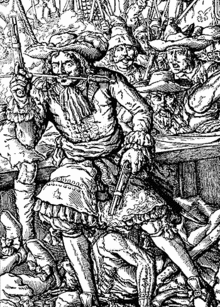Michel de Grammont
| Michel de Grammont | |
|---|---|
 | |
| Born |
c. 1645 Paris, France |
| Died |
April 1686 near St. Augustine, Florida |
| Nickname | Chevalier de Grammont |
| Type | Buccaneer |
| Allegiance | France |
| Years active | c. 1670 - 1686 |
| Rank | Admiral |
| Base of operations | Caribbean |
| Commands | Hardi |
Michel de Grammont (c. 1645 – 1686?) was a French pirate. He was born in Paris, France and was lost at sea in the north-east Caribbean, April 1686. His pirate career lasted from around 1670 to 1686 during which he commanded the flagship Hardi. Primarily attacked Spanish holdings in Maracaibo, Gibraltar, Trujillo, La Guaira, Puerto Cabello, Cumana and Veracruz.
Biography
Chevalier de Grammont was a nobleman who came into disfavour after killing his sister's suitor in a duel. Forced to leave France, he went to Hispaniola where he was given a French ship and served as a privateer. His first success was the capture of a Dutch convoy, valued at about 400,000 livres (US$4 million). On his next voyage he ran on a reef and sank. Grammont moved to Tortuga where he bought and outfitted a new ship which he used to attack Spanish shipping. When war broke out between France and the Dutch Republic in 1678, he joined a fleet under the command of Comte d'Estrées for an abortive raid on the Dutch island of Curaçao; however, the entire fleet of 17 vessels was wrecked on the Las Aves Archipelago.[1]
In June 1678 he was made commander of the six ships and 700 men salvaged from the Las Aves Disaster. De Grammont landed his men in Spanish-held Venezuela and captured Maracaibo, as well as several smaller towns including Gibraltar, penetrating as far inland as Trujillo. For the next six months the pirates plundered the entire region. This was followed by another successful raid on the Venezuelan port of La Guaira, captured in a daring night attack, though the buccaneers only escaped with difficulty when attacked by a larger Spanish force.
In June 1680, de Grammont joined forces with Thomas Paine and a captain named Wright at Blanquilla Island. Together with 50 men they successfully raided the town of Cumana although it was defended by 2,000 Spanish soldiers and 17 ships with 328 cannons. Grammont however was badly wounded by a sword and returned to Las Aves to recover.
Following his recovery, de Grammont commanded eight ships but had no success until 1682 when, at the request of the governor of Petit-Goâve (actual Haiti), he joined Nicholas van Hoorn to harass Spanish shipping. During this period they attacked ships which unknown to them belonged to the Dutch pirate Laurens de Graaf, on meeting de Graaf on Bonaco Island they asked him to join them. De Graaf initially refused but later agreed.[2]
In May 17, 1683, de Grammont, van Hoorn, Yankey Willems, and de Graaf sacked Veracruz in Mexico, taking 4,000 prisoners for ransom. Using two captured Spanish galleons in the vanguard, Yankey Willems and Laurens de Graaf were able to sneak into the Spanish harbor during the early morning hours and landed a small force on shore. The buccaneers caught the garrison off guard, many of the soldiers still sleeping, and took out the city's defenses allowing the rest of the fleet to enter the harbor. After three or four days, Willems and the others looted the town before retreating at the sight of the New Spain fleet.[3] Later Grammont raided Spanish Florida settlements, including St.Augustine and the Mocama mission province, forcing further southward migrations.[2]
In July 1685, de Grammont and de Graaf sacked the Mexican city of Campeche: however, after two months of plundering the city with little result, de Grammont sent a demand for ransom to the governor, who refused. De Grammont then commenced to execute prisoners as retaliation, but de Graaf stopped the executions and de Grammont parted company from his allies.[2]
De Grammont was last seen in April 1686 sailing in the northeast direction sailing off of St. Augustine, Florida. Although his exact fate is unknown, his ship was reported lost with all hands in a storm shortly after he set sail.
References
- ↑ Konstam, Angus (2008). Piracy: The Complete History. Osprey Publishing.
- 1 2 3 Little, Benerson (2007). The Buccaneer's Realm: Pirate Life on the Spanish Main, 1674–1688. Potomac Books.
- ↑ Konstam, Angus. Pirates: An Illustrated History. New York: Skyhorse Publishing, 2007. (pg. 118-119) ISBN 1-60239-035-5
- Pickering, David (2006) Pirates. CollinsGem. HarperCollins Publishers, New York, NY. pp-59.
